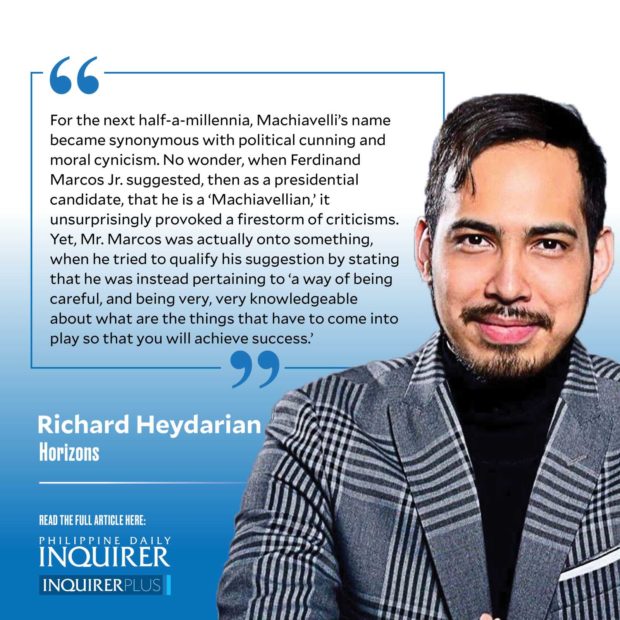Virtù: On Machiavelli and Marcos
 Florence—At the Palazzo Vecchio, the political beating heart of Florence, one can easily be visually overwhelmed by the aesthetic legacy of the finest artists of the past millennia. At once, the iconic building, towering over the picturesque Piazza della Signoria, captures the passionate history and historical passions of the city’s finest citizens.
Florence—At the Palazzo Vecchio, the political beating heart of Florence, one can easily be visually overwhelmed by the aesthetic legacy of the finest artists of the past millennia. At once, the iconic building, towering over the picturesque Piazza della Signoria, captures the passionate history and historical passions of the city’s finest citizens.
Here, kings were toppled, revolutions were launched, and republics were made and remade against the greatest odds. The Palazzo houses variegated portrayals, both in painting and sculpture, of the thousand elements that made Florence a civilizational hub at the dawn of modernity. Subtle and self-serving references to ancient myths and warriors, especially from the Graeco-Roman world, expressly bolstered the legitimacy of Florentine leaders, most notably the House of Medici.
Drenched in the opulence of the Audience Chamber and the Hall of Lilies, an unsuspecting visitor, however, might end up missing a quiet corner, which houses memories of one of the most influential thinkers of the past millennia. Just steps away before the tour of the Palazzo ends, there is an inconspicuous room, named Old Chancellery, which hosts effigies of Niccolò Machiavelli. Though perhaps not as famous as Dante and Da Vinci, the Florentine statesman is arguably the most infamous thinker of his era, thanks to a posthumous published work, “The Prince” (1532).
An author of numerous books, many published during his own lifetime, Machiavelli’s most controversial work ended up as his most influential. After all, here was a man who advised leaders “to conquer by force or fraud, to make himself beloved and feared by the people.” He was fascinated by brutal leaders such as Cesare Borgia, whom he praised “as an example to be imitated.” Machiavelli spoke of the need “to win by force what can be won by deception” and advised princes, “[i]f an injury has to be done to a man it should be so severe that his vengeance need not be feared.”
For the next half-a-millennia, Machiavelli’s name became synonymous with political cunning and moral cynicism. No wonder, when Ferdinand Marcos Jr. suggested, then as a presidential candidate, that he is a “Machiavellian,” it unsurprisingly provoked a firestorm of criticisms. Yet, Mr. Marcos was actually onto something, when he tried to qualify his suggestion by stating that he was instead pertaining to “a way of being careful, and being very, very knowledgeable about what are the things that have to come into play so that you will achieve success.”
Mr. Marcos was likely referring to what Machiavelli identified as the ability to achieve great things based on political skill and competent leadership. Almost singlehandedly, the renaissance thinker demystified power by effectively introducing the notion of performance-based legitimacy, a bedrock of modern politics.
Machiavelli is a deeply misunderstood figure. As French philosopher Jean-Jacques Rousseau argued, “The Prince” was less a celebration and more an exposure of the amoral side of power politics. Moreover, Rousseau was correct to describe Machiavelli as “an honest man and a good citizen.” After all, the Florentine thinker spent a lifetime protecting his homeland from predatory powers gnawing at the deeply-divided Italian polities, while barely surviving vicious politics in Florence.
By all accounts, he was an unquestionable patriot and skilled diplomat, who dedicated his life to defending the Florentine republic in an era of monarchical tyranny. Motivations behind his “tell-all” book are debatable, but here is also a man who celebrated the power of love and the virtues of republicanism. In his “Discourses on Livy” (1531), a more nuanced and measured Machiavelli argued, “[M]en are driven by two principal impulses, either by love or by fear, so that anyone who makes himself loved can command them just as easily as anyone who makes himself feared.” He spoke of “exceptional ability,” and the virtues of “extremely able men,” rather than duplicity and brutality per se, as the ultimate mettle of leadership.
Almost three months into office, Mr. Marcos—navigating a treacherous internal and external political landscape—has shown that he may have learned a thing or two from the great Italian thinker. It remains to be seen, however, if he ends up as the truly competent and capable leader that Machiavelli had in mind for the survival and prosperity of his beloved homeland.
rheydarian@inquirer.com.ph




















